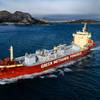ABS CTO Weighs in on Smart Shipping
In a lecture titled “A Brave New World,” Fireman outlined the challenges that will be introduced by the marine industry’s transformation to autonomous vessels, explaining how data, systems and software will evolve to self-sufficiency on the vessel as navigational control and operational decision-making become more centralized. Recent changes already have affected the way industry looks at safety, he said, expanding the definition to include cybersecurity and software assurance.
Fireman identified some emerging technologies – advanced sensors robotics and artificial intelligence – that he says are establishing a “new normal” in industry and pointed out the changes these technologies might introduce. “I can envision a future scenario where a command center evaluates and issues drones for repair of an unmanned vessel – with no human intervention on board,” he said.
Autonomy introduces a new set of functional requirements, which introduces design and engineering principles that are more risk-based, Fireman explained. “Technical review for safety and regulatory compliance will be critical to verify automated systems meet expected standards,” he said. “This is where classification societies play a vital role by establishing and maintaining independent rules.”
The department of Naval Architecture and Marine Engineering (NAME) at the University of Michigan was started in 1879 with an act of Congress authorizing a Navy officer to teach “steam engineering and iron shipbuilding.” Since this modest beginning, NAME has grown into a worldwide leader in education and research, developing engineers and technology to advance the state of the art for systems operating in the marine environment.















